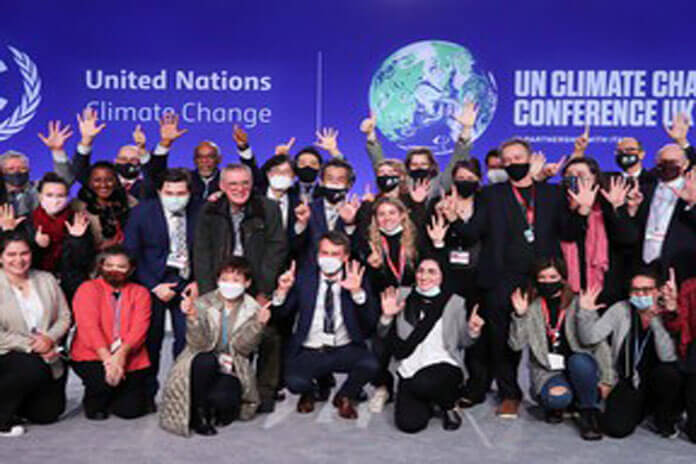GLASGOW, Scotland, Sat. Nov. 13, 2021 — The 26th climate change conference ended on Saturday evening after a last-minute pushback from India and China to water down the language of the Glasgow Climate Pact. The agreement, for the first time, explicitly mentions the phasing out of fossil fuels, but the language in paragraph 36 of the text, which was adjusted at the last minute, makes the use of both coal and fossil fuel subsidies a possibility for developed countries.
That portion of the text states,”Parties to accelerate the development, deployment and dissemination of technologies, and the adoption of policies, to transition towards low-emission energy systems, including by rapidly scaling up the deployment of clean power generation and energy efficiency measures, including accelerating efforts towards the phase-down of unabated coal power and inefficient fossil fuel subsidies, recognizing the need for support towards a just transition.”
The final-hour demands made by China and India led to a change of the term “phasing-out” in the Glasgow Pact to the words “phasing-down” in reference to the use of unabated coal power. This means major greenhouse gas emitters using coal power like India and China would still be able to use that form of energy if technology is adapted to capture and store the carbon waste. It must be noted that many of these technologies have not yet been developed and tested.
Also, New Delhi wanted the language to cover inefficient coal use, but this was ultimately not allowed by the president of the conference.
In paragraph 36, the phasing down of “inefficient” fossil fuel subsidies is noted. This keeps the door open for subsidies for purported “efficient” fossil fuel use. While the United States takes credit for the preservation of the language, it must be noted that new fossil fuel projects in that country like the Line 3 pipeline and leases for oil drilling indicates a less climate-conscious approach on the part of that so-called climate leader.
John Kerry, the US climate envoy, said, “Did I appreciate we had to adjust one thing tonight in a very unusual way? No. But if we hadn’t done that, we wouldn’t have a deal. I’ll take phase it down and take the fight into next year.”
The position of China and India was enough to cause a breakdown of the entire agreement, and COP26 president Alok Sharma choked back tears as he apologized for the last-minute change to the very important language.
“I apologize for the way this process has unfolded. And I am deeply sorry. I also understand the deep disappointment. But as you have also noted. I think it’s vital that we protect this package.” COP26 president Sharma said to the delegates following the major change.
What is being feared is a greenwashed business-as-usual approach being taken by major emitters who might take advantage of the weakness in the language of paragraph 36 of the Glasgow Climate Pact. The agreement could allow for countries to continue subsidies for fossil fuel production while portraying themselves as supporters of carbon capture and storage.
During an interview with reporters, Sharma said, “Of course I wish that we had managed to preserve the language on coal that was originally agreed.”
This decision to alter the terms of the new pact, which observers say still falls short of the goals of the Paris Agreement, will adversely affect, not those four major coal emitters, China, India, the US, and the EU, but small island developing states like Belize, and our sister nations and those in the Pacific Islands.
This summit started with calls to and by world leaders for high ambition to guide its decision-making, to keep the increase in global temperatures below 1.5 degrees by 2050. While after the two weeks of negotiation in Glasgow the near 200 diplomats agreed to increase carbon-cutting commitments, phase out some fossil fuels and increase financing to developing countries, experts still say more is needed and urge leaders to deliver more ambitious NDCs at the upcoming COP27, to be held in Egypt in 2022.
Unfortunately, COP26 again is being viewed as a failure by environmentalists, who say the parties fell short of implementing the urgent climate action needed to stop the warming of the planet. For now, the spotlight is on countries like India for its position on the use of coal power, but major economic powers like the United States, who have just officially rejoined the fight after being pulled out of the Paris Agreement by its previous president, Donald Trump, are being looked at to deliver more meaningful contributions toward this global fight.

